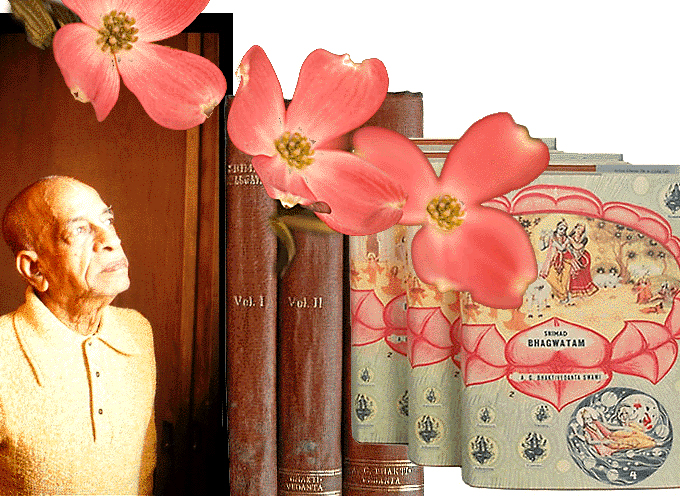
|
|
||||||||||||
|
BY: SUN STAFF

May 20, 2011 — CANADA (SUN) — A serial exploration of Srila Prabhupada's preaching on Srimad Bhagavatam. Today we'll proceed with the next slokas of Srimad Bhagavatam -- 1.1.7, 1.1.8 and 1.1.9. We are grouping the three together because Srila Prabhupada lectured only on SB 1.1.9. We begin with the slokas and purports from Srila Prabhupada's original Srimad Bhagwatam, offering a side-by-side comparison of the slokas and translations as they appeared in the Bhagwatam and the first BBT Bhagavatam edition. Here is Text 7 of the First Chapter, First Canto of Srimad Bhagavatam, with the sloka from Bhagwatam on the left, and from Bhagavatam (without diacritics) on the right:
Here is the original Bhagwatam text for SB 1.1.7: FIRST CANTO FIRST CHAPTER TEXT NO. 7 Yani Vedavidam Shrestho Bhagwan Badaryana Anye Cha Munayah Suta Parabaravido Viduh Yani—all that, vedavidam—scholars of the Vedas, shreshtho—Seniormost, Bhagwan—incarnation of Godhead, badarayana—Vyasdeva, anye—others, cha—and, munayah—the sages, Suta—oh Suta Goswami, Parabarovido—amongst the learned scholars one who is conversant with physical and metaphysical knowledge, Vidu—one who knows. "The seniormost learned Vedantist Oh Suta Goswami, you are acquainted with knowledge of Vyasdeva who is incarnation of Godhead as well as with other sages who are fully conversant in all kinds of physical and metaphysical learnings. Srimad Bhagwat is the natural commentation of the Brahma-Sutra or the Vadrayani Vedanta Sutras. It is natural because Vyasdeva is author of both the Vedanta Sutras as well as Srimad Bhagwat the essence of all vedic literatures. Besides Vyasdeva there are other sages who are the authors of six different philosophical systems. They are Goutama, Kanada, Kapila, Patanjali, Juimine, Astabkra etc. Theism in complete is explained in the Vedanta Sutra whereas in other system of philosophical speculations, practically no importance has been awarded to the ultimate cause of all causes. One is there expected to sit on Vyasa Asana after being conversant with all the systems of philosophy so that one can present fully the theistic views of Bhagwat in defiance of all other system. Srila Suta Goswami was the right type of teacher and therefore the sages at Naimisharanya elevated him on the seat of Vyasa Asana. Srila Vyasadeva is designated hearin as Personality of Godhead because He is the authorised-in-power incarnation of the Personality of Godhead." As seen below, there are a number of differences between the original Bhagwatam sloka translation (left) and the later BBT edition version (right):
Here is Text 8 of the First Chapter, First Canto of Srimad Bhagavatam, with the sloka from Bhagwatam on the left, and from Bhagavatam (without diacritics) on the right:
Here is the original Bhagwatam text for SB 1.1.8: FIRST CANTO FIRST CHAPTER TEXT NO. 8 Bethwa Twam Soumya Tat Sarbam Tatwata Tat Anugrahat Bruyuh Snigdhasya Sisyasya Gurobo Guhyam Apyuta Bethwa—you are well conversant, twam—your honour, Soumya—on who is pure and simple, tat—those, sarbom—all, tatwata—in fact, tat—their, anugrahat—by the favour of, sisyasya—of the disciple, snigdhasya—of the one who is submissive, gurubo—of the spiritual masters, apyutam—endowed with. "And because you are submissive your spiritual masters have endowed you with all the favours, of the spiritual masters, for gentle disciples. As such you can let us know all that you learnt from them scientifically. The secret of success in the spiritual advancement of knowledge is to satisfy the spiritual master and thereby to get his sincere blessings. Srila Viswanath Chakravarty Thakur has sung in his famous eight stanzas on the spiritual master as follows:—"I do offer my respectful obeisances unto the lotus feet of spiritual master whose satisfaction alone can please the—Personality of Godhead and whose dissatisfaction alone can play a havoc on the path of spiritual realisation." It is essential, therefore, that a disciple must be very much obedient and submissive to the bonafide spiritual master. Srila Suta Goswami fulfilled all these conditions in the relation of a disciple and the spiritual master and, therefore, he was endowed with all the favours of the learned and self realised spiritual masters like Srila Vyasdeva and others. The sages of the Naimisharanya were confident about the qualities of Srila Suta Goswami and, therefore, they were anxious to hear from him." As seen below, there are a number of differences between the original Bhagwatam sloka translation (left) and the later BBT edition version (right):
Here is Text 9 of the First Chapter, First Canto of Srimad Bhagavatam, with the sloka from Bhagwatam on the left, and from Bhagavatam (without diacritics) on the right:
Here is the original Bhagwatam text for SB 1.1.9: FIRST CANTO FIRST CHAPTER TEXT NO. 9 Tatra tatra anjasa ayusman bhabata jad vinischitam Punsam ekantatah shreyah tat sansitum arhasi. Tatra—thereof, tatra—thereof, anjasa—made easy, aynsman—blessed with good duration of life, bhabata—by your goodself, Yad—whatever, vinischitam—ascertained, tat—those, punsam—for the people in generul, ekantam—absolutely, shreyah—ultimate good, tat—that, nah—to us, samsitum—to explain, arhasi—deserve. "You are, therefore, requested to explain to us what you ascertained to be the absolute and ultimate good for the people in general,—out of your considered and made easy opinion. Oh you are blessed with good old age. In the Bhagwat Geeta worshiping the Acharyas is recommended. The acharyas and Goswamins are always compact in thought for the well being of the people in general specially for their spiritual well being. Spiritual well being is automatically followed by material well being. The Acharyas, therefore, give direction in the matter of spiritual well being of the people in general. Foreseeing the incompetencies of the people in this age of Kali or the iron age of quarrel, the sages enquired from the Suta Goswami the summary of all the revealed scriptures because the people of this age are almost condemned in every respect. The sages, therefore, enquired of the absolute and ultimate good for the people. The condemned state of affairs of the people of this age is described as follows:— As seen below, there are a number of differences between the original Bhagwatam sloka translation (left) and the later BBT edition version (right):
| ||||||||||||